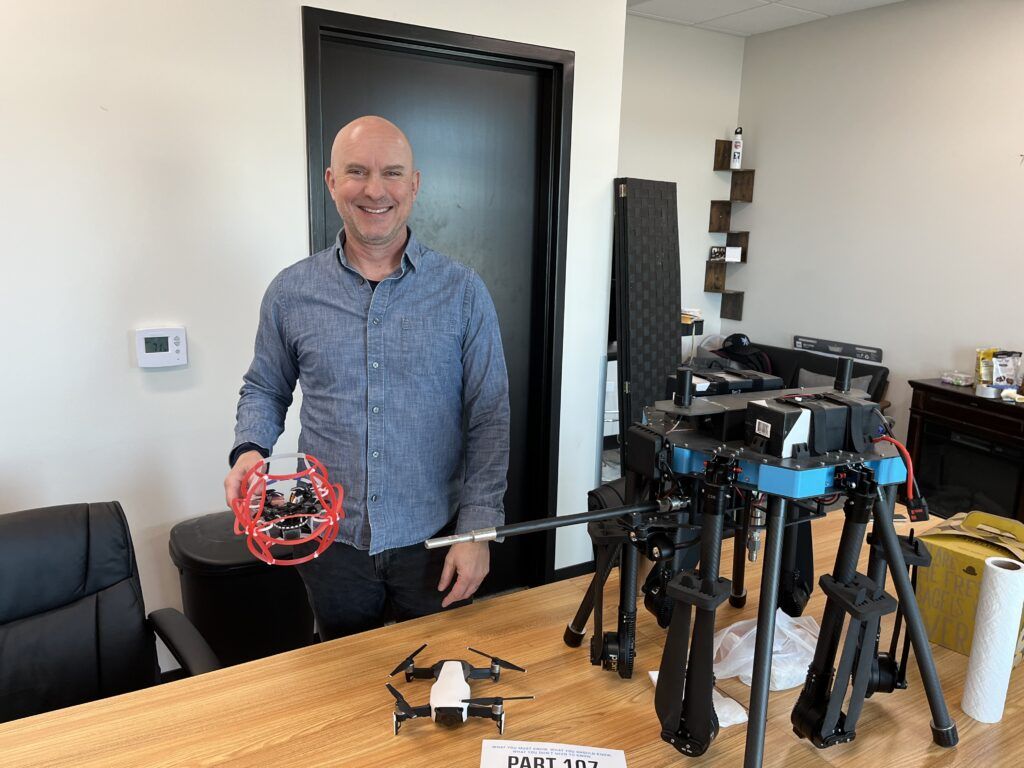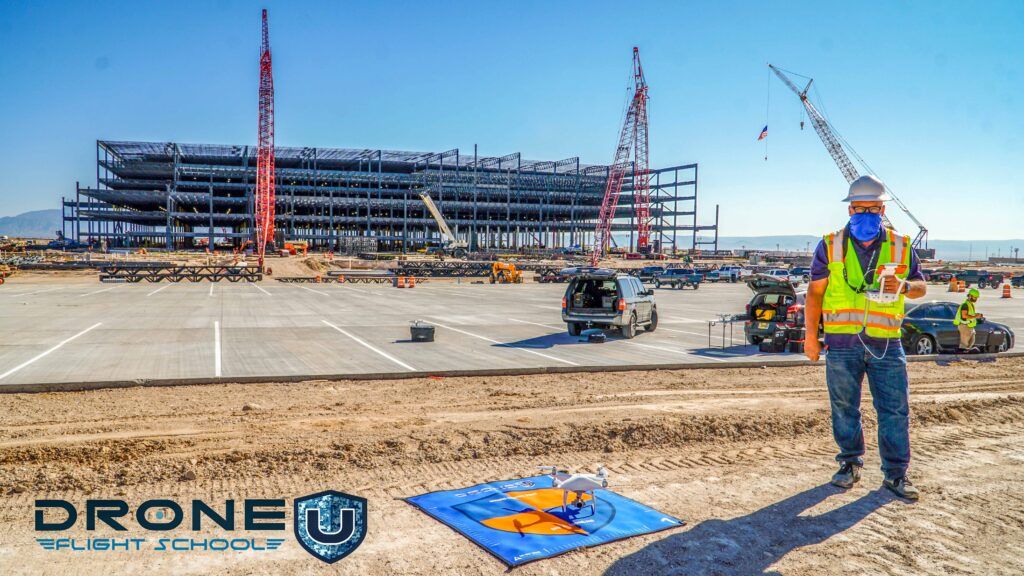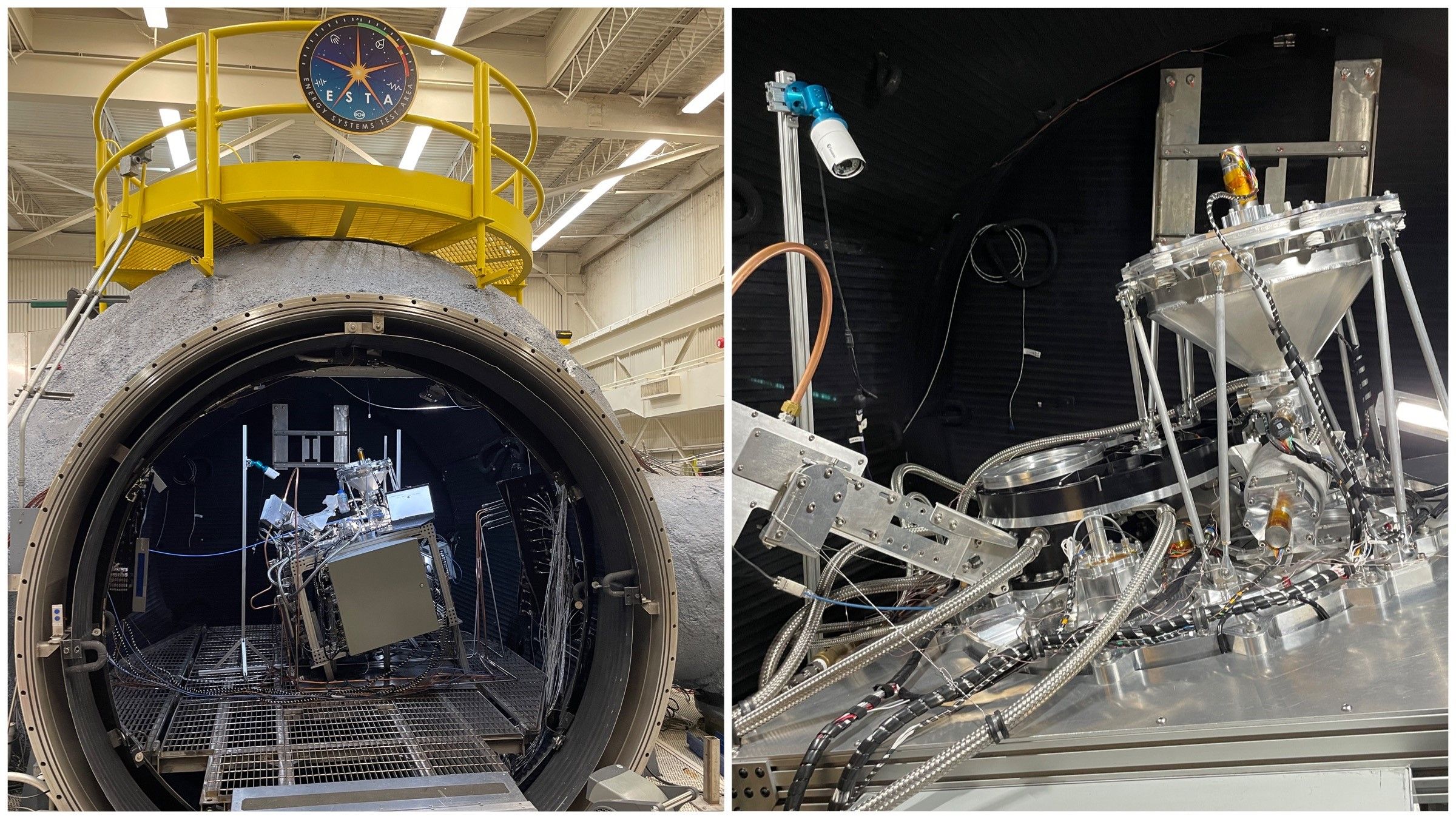Drone school takes flight from new HQ in Loveland

LOVELAND — Some might see it and bring to mind Star Wars. Others, Quidditch, the sport of Harry Potter wizard fame.
Rob Burdick, chief financial officer of new Loveland company DroneU, wouldn’t know about the Harry Potter reference, as neither he nor his family have gotten into the J.K. Rowling books. But he does know that the new sport of drone soccer is incredibly popular and, while it may be seen as whimsical, it is part of the effort to teach kids about topics in science, technology, engineering and math, or STEM, while recruiting students for careers in aviation.
Burdick and his partner, CEO Paul Aitken, know that what they have with a drone training school in Loveland is important to the development of not just drone soccer players and teachers but also for all manner of aerial pursuits.

DroneU, a small three-person company, has its home at 205 E. 71st St. in north Loveland. It moved to the community from Albuquerque, New Mexico, because it was seeking a better environment for the company to grow.
Its office contains a small conference room up front, two studios for recording podcasts and training videos, a backyard space to launch outdoor drone gear and a lot of gear and spare parts for drones.
It doesn’t sell drones but teaches people to fly them.
The company started online in 2013 as a training academy, added in-person training — which was largely paused during the pandemic — and now has begun to re-establish the in-person piece.
Its work touches more than just education of kids on how to make and fly drones but applies to numerous industries around the country.
On the day that Burdick met with BizWest, a person who uses drones to inspect cell-phone towers was visiting to help produce podcasts or videos on the topic. The man contracts with DroneU to teach the skill. He’s one of about 15 contract teachers for the school.
“We only use trainers who teach what they do professionally,” Burdick said. “This is different from our competitors.”
The company has numerous competitors, but DroneU has an advantage in how it recruits and uses experts to help other operators become experts.
Aitken was off-site early this week meeting with the internal drone school operated by the Loveland Fire Department. He was consulting with those trainers and determining how DroneU might help.
Fire departments are important customers of DroneU. The Las Vegas Fire Department uses DroneU for training. The New York Fire Department, considered experts among experts in flying drones “in one of the most difficult environments in the world,” visits the company a couple of times each year to lend expertise. “We always invite in the local departments when they’re in town,” Burdick said.
Among its corporate clients, DroneU works with Tesla Inc., training its drone operators who inspect solar fields using the technology. It also has signed a deal with the state of New York to provide the training of all the instructors who will run drone soccer programs. Drone soccer has its home since 2022 in Colorado Springs, with competitions across the country. School district programs help students build drone kits — a small drone inside a protective soccer-ball-appearing cage. Students program their drones and fly them in competition inside a fenced course.
DroneU has two platforms.
The first is Drone Service Provider, which taps into the 45-50 courses available online at DroneU. It takes, for example, a typical drone usage of photography to create maps after capturing images, stitching them together, making 3D models and so forth.
Its Enterprise Level Platform progresses past what’s available as a service provider to teach a deeper understanding of the techniques.
“Our more in depth constituents are those looking to make money at it,” he said.
Only about 10% of the company’s customer base are hobbyists, although he recommends that all drone pilots have at least some training or they’ll be disappointed with their investment in the equipment.
Amateurs should “at least take the FAA (Federal Aviation Administration) trust test,” he said.
DroneU when it was launched entered the “wild wild west” of drone aviation where no one knew or observed the rules.
The FAA tried to apply the licensing requirement for manned aircraft to drone pilots, but that failed. In August 2016, the FAA published Part 107, which required licensing through the federal agency. DroneU took the thousands of pages of the administrative rules and produced an easier-to-read study guide. To fly commercially, pilots need to pass Part 107.
DroneU offers the coursework, after which students can take the test at an approved testing center. They’ll learn things like how they aren’t supposed to fly over people, and how to legally fly at night (it requires a waiver.)
“When you turn 16, you get a driver’s license, but that doesn’t mean you know how to drive,” Burdick said. Part 107 is what he called the starting line in learning to fly a drone.
People operating without training are likely to fly out of compliance with FAA rules, probably haven’t registered their drones with the FAA and “there’s a good chance you’ll crash,” he said.
Teaching use of drones is “really a hands-on activity.” Some of the work can and is done online, but “training needs to be a hybrid” of in-person and online, Burdick said.
While students may come from all over the country after completing online modules, they complete their training in person. Often, those students will practice over a farm property near Longmont, where the school flies with permission.
“We always ask permission” to fly over someone’s land, although by law they aren’t required to seek permission.
Costs to participate in flying drones spans a wide range. An amateur could buy a drone for a few hundred dollars and receive basic training through a provider such as DroneU. The all-in price would be $600 to $800, Burdick estimated.
For someone wanting to fly commercially and inspect cell towers, for example, the all-in cost might be about $10,000 with the drone hardware cost of about $6,000 plus the additional training. The investment could be returned quickly, he said, with a contract for inspecting multiple cell towers quickly equaling that amount.
A drone used to apply disinfectants to stadiums or to clean high altitude windows on buildings might cost $50,000, he said.
DroneU’s basic price is $57 per month or 12 months for $527 per year. Most clients of the school are involved, on average, 12.5 months, Burdick said. Many also log into the school’s podcasts, askdroneu.com, where 1,300 episodes are archived. Burdick, the numbers man for the operation, said the podcast has experienced 8 million downloads.

LOVELAND — Some might see it and bring to mind Star Wars. Others, Quidditch, the sport of Harry Potter wizard fame.
Rob Burdick, chief financial officer of new Loveland company DroneU, wouldn’t know about the Harry Potter reference, as neither he nor his family have gotten into the J.K. Rowling books. But he does know that the new sport of drone soccer is incredibly popular and, while it may be seen as whimsical, it is part of the effort to teach kids about topics in science, technology, engineering and math, or STEM, while recruiting students for careers in aviation.
Burdick and his…
THIS ARTICLE IS FOR SUBSCRIBERS ONLY
Continue reading for less than $3 per week!
Get a month of award-winning local business news, trends and insights
Access award-winning content today!





